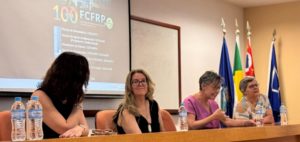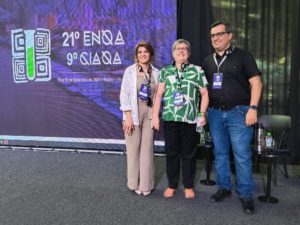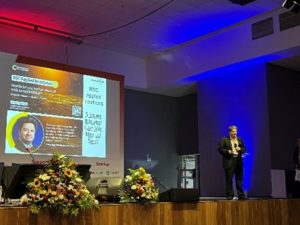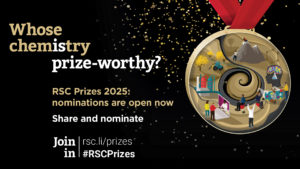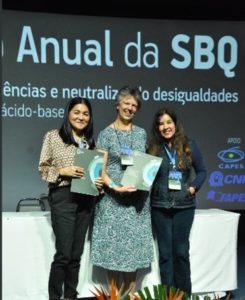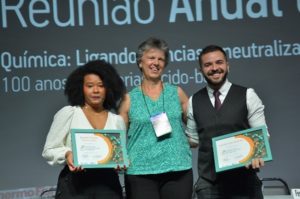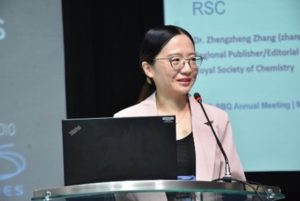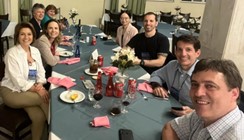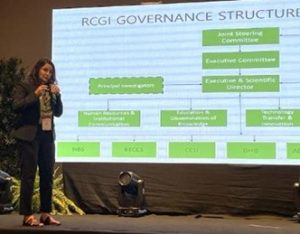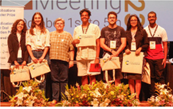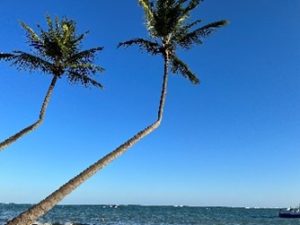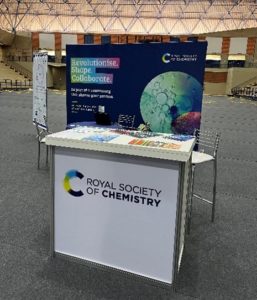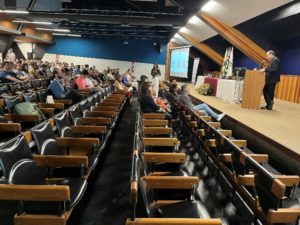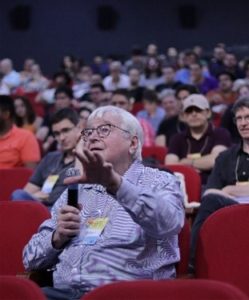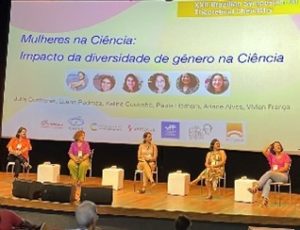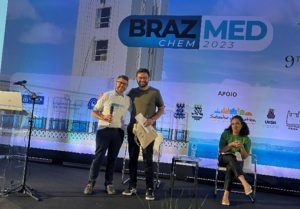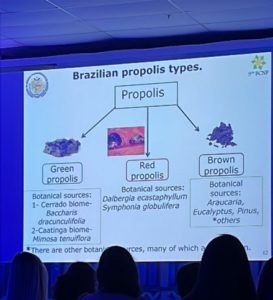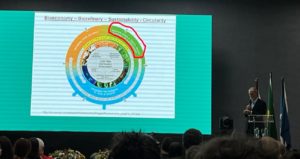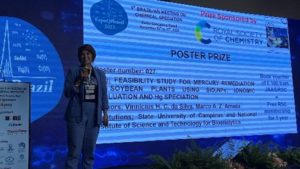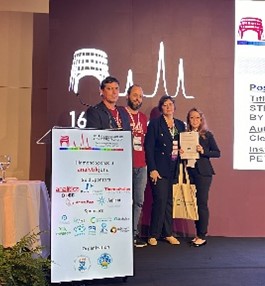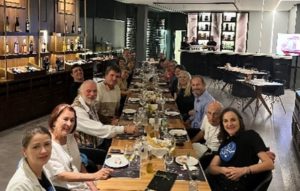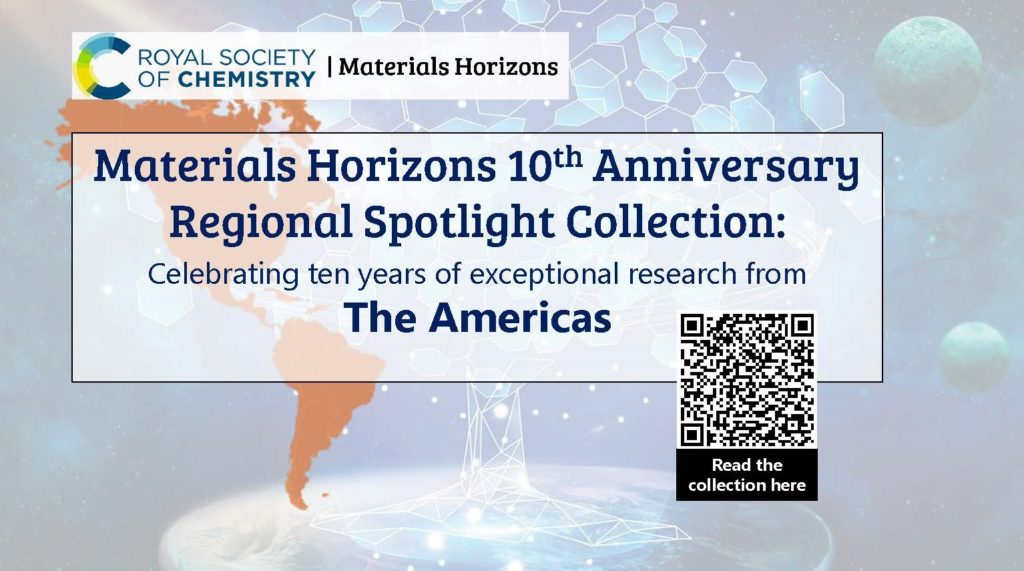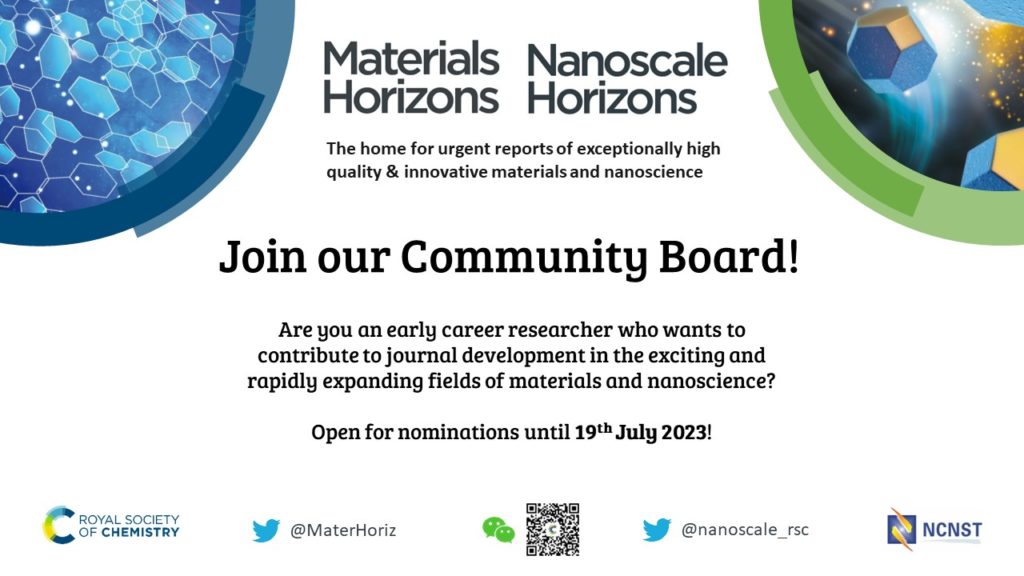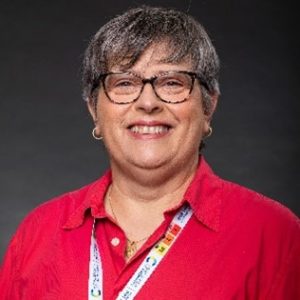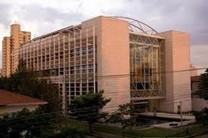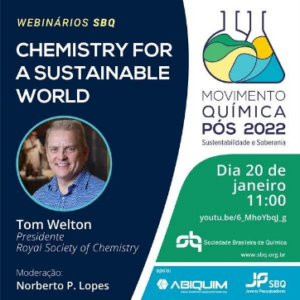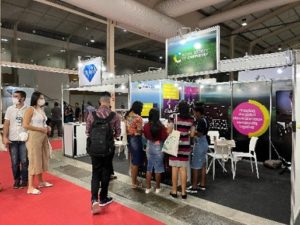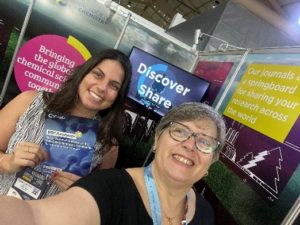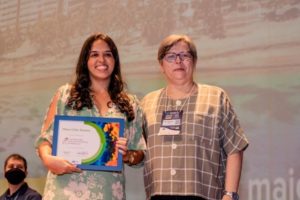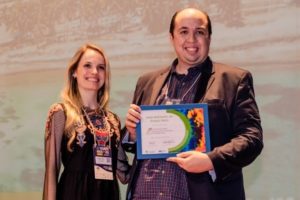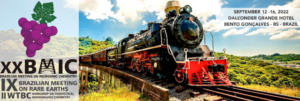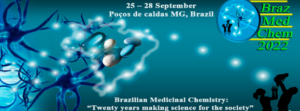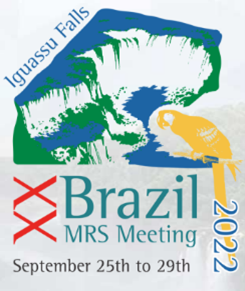With the end of 2023, the RSC Americas office would like to take the opportunity to recognize all of the Editorial and Advisory board members who joined the RSC’s journals over 2023, especially those who have begun since we last recognized new board members in February 2023. It is only through the hard work and guidance of these outstanding researchers that the Royal Society of Chemistry is able to maintain its essential community focus, while being a leading international scientific publisher. Thank you all for everything you have done this year, and we look forward to 2024!
New Editorial Board Members:
James Batteas, Texas A&M University (USA)
RSC Mechanochemistry, Editor-in-Chief
Miaofang Chi, Oak Ridge National Laboratory (USA)
Nanoscale Horizons, Editorial Board Member
William Chueh, Stanford University (USA)
Energy & Environmental Science, Editorial Board Member
Debbie Crans, Colorado State University (USA)
New Journal of Chemistry, Editorial Board Member
Alessandra Eustaquio, University of Illinois at Chicago (USA)
Natural Product Reports, Editorial Board Member
Andrew Ferguson, University of Chicago (USA)
Molecular Systems Design & Engineering, Deputy Editor-in-Chief
Raj Gounder, Purdue University (USA)
Reaction Chemistry & Engineering, Associate Editor
Ling Hao, George Washington University (USA)
Molecular Omics, Editorial Board Member
Kelsey Hatzell, Princeton University (USA)
Materials Horizons, Editorial Board Member
Rebekka Klausen, John Hopkins University (USA)
Polymer Chemistry, Associate Editor
Dominik Konkolewicz, Miami University (USA)
Polymer Chemistry, Associate Editor
LaShanda Korley, University of Delaware (USA)
Molecular Systems Design & Engineering, Editorial Board Member
Chao-Jun Li, McGill University (Canada)
ChemComm, Associate Editor
Matthew Lockett, University of North Carolina at Chapel Hill (USA)
Analytical Methods, Associate Editor
James Mack, University of Cincinnati (USA)
RSC Mechanochemistry, Editorial Board Member
Neal Mankad, University of Illinois at Chicago (USA)
Dalton Transactions, Associate Editor
Heidi Mansour, Florida International University (USA)
RSC Pharmaceutics, Associate Editor
Spiridoula Matsika, Temple University (USA)
PCCP, Associate Editor
Jeffrey Moore, University of Illinois (USA)
RSC Mechanochemistry, Editorial Board Member
Jasquelin Peña, University of California, Davis (USA)
Environmental Science: Processes & Impacts, Associate Editor
Emily Pentzer, Texas A&M University (USA)
RSC Applied Polymers, Editor-in-Chief
Ryan Richards, Colorado School of Mines (USA)
RSC Applied Interfaces, Associate Editor
Robert Riggleman, University of Pennsylvania (USA)
Molecular Systems Design & Engineering, Associate Editor
Eric Rivard, University of Alberta (Canada)
Dalton Transactions, Associate Editor
Changquan Calvin Sun, University of Minnesota (USA)
CrystEngComm, Editorial Board Member
Wilfred Tysoe, University of Wisconsin-Milwaukee (USA)
RSC Mechanochemistry, Editorial Board Member
Justin J. Wilson, Cornell University (USA)
Inorganic Chemistry Frontiers, Associate Editor
Ngai Yin Yip, Columbia University (USA)
Environmental Science: Advances, Associate Editor
New Advisory Board Members:
Maria Angela A Meireles, Universidade Estadual de Campinas (Brazil)
Sustainable Food Technology, Advisory Board Member
Gregg Beckham, National Renewable Energy Laboratory (USA)
Green Chemistry, Advisory Board Member
Alexis Bell, University of California, Berkeley (United States)
EES Catalysis, Advisory Board Member
David N. Beratan, Duke University (USA)
Chemical Science, Advisory Board Member
Roberto Berlinck, University of Sao Paulo (Brazil)
Natural Product Reports, Advisory Board Member
Viola Birss, University of Calgary (Canada)
RSC Applied Interfaces, Advisory Board Member
Barry Blight, University of New Brunswick (Canada)
Chemical Society Reviews, Advisory Board Member
Daria Boffito, Polytechnique Montreal (Canada)
RSC Mechanochemistry, Advisory Board Member
Adam Braunschweig, New York University (USA)
RSC Mechanochemistry, Advisory Board Member
Jeff WM Bulte, The Johns Hopkins University School of Medicine (USA)
Sensors & Diagnostics, Advisory Board Member
Charles T. Campbell, University of Washington (United States)
EES Catalysis, Advisory Board Member
Emanuel Carrilho, Federal University of São Carlos (Brazil)
Analytical Methods, Advisory Board Member
Victor Castaño, Universidad Nacional Autónoma de México (Mexico)
RSC Applied Interfaces, Advisory Board Member
Jingguang Chen, Columbia University (United States)
EES Catalysis, Advisory Board Member
Zhongwei Chen, University of Waterloo (Canada)
EES Catalysis, Advisory Board Member
Michael Cohen, Oregon Health & Science University (USA)
Chemical Science, Advisory Board Member
Conor Coley, Massachusetts Institute of Technology (USA)
Digital Discovery, Advisory Board Member
Maria G. Corradini, University of Guelph (Canada)
Sustainable Food Technology, Advisory Board Member
Qiang Cui, Boston University (USA)
New Journal of Chemistry, Advisory Board Member
Mita Dasog, Dalhousie University (Canada)
Nanoscale, Advisory Board Member
Sylvia Daunert, University of Miami (USA)
Sensors & Diagnostics, Advisory Board Member
Jailson de Andrade, Universidade Federal da Bahia (Brazil)
Analytical Methods, Advisory Board Member
Juan de Pablo, University of Chicago (USA)
Molecular Systems Design & Engineering, Advisory Board Member
Pablo Andres Denis, Universidad de la República Facultad de Química (Uruguay)
New Journal of Chemistry, Advisory Board Member
Dino Di Carlo, University of California, Los Angeles (USA)
Lab on a Chip, Advisory Board Member
Charles Dismukes, Rutgers University (United States)
EES Catalysis, Advisory Board Member
Yizhou Dong, The Ohio State University (USA)
Biomaterials Science, Advisory Board Member
Abigail Doyle, University of California, Los Angeles (USA)
Digital Discovery, Advisory Board Member
Jairton Dupont, Federal University of Rio Grande do Sul (Brazil)
Dalton Transactions, Advisory Board Member
Chris Easley, Auburn University (USA)
Analytical Methods, Advisory Board Member
Martin Eastgate, Bristol Myers Squibb (USA)
Green Chemistry, Advisory Board Member
Marc Edwards, Virginia Tech (USA)
Environmental Science: Water Research & Technology, Advisory Board Member
R. Dario Falcone, Consejo Nacional de Investigaciones Científicas y Técnicas (Argentina)
New Journal of Chemistry, Advisory Board Member
Baizeng Fang, The University of British Columbia (Canada)
Energy Advances, Advisory Board Member
Omar K. Farha, Northwestern University (USA)
CrystEngComm, Advisory Board Member
Hao Feng, North Carolina A&T State University (USA)
Sustainable Food Technology, Advisory Board Member
Ian Foster, University of Chicago (USA)
Digital Discovery, Advisory Board Member
Natia Frank, University of Nevada (USA)
Chemical Science, Advisory Board Member
Dinorah Gambino, University of the Republic (Uruguay)
New Journal of Chemistry, Advisory Board Member
Rebecca Gieseking, Brandeis University (USA)
Materials Horizons, Advisory Board Member
José Goldemberg, University of São Paulo (Brazil)
Energy & Environmental Science, Advisory Board Member
John Gordon, Brookhaven National Laboratory (USA)
Energy Advances, Advisory Board Member
Carlos F. O. Graeff, São Paolo State University (Brazil)
Journal of Materials Chemistry C, Advisory Board Member
Alexis Grimaud, Boston College (USA)
Chemical Science, Advisory Board Member
Alexander Gundlach-Graham, Iowa State University (USA)
Journal of Analytical Atomic Spectrometry, Advisory Board Member
Will Gutekunst, Georgia Tech (USA)
Chemical Science, Advisory Board Member
Susan Habas, National Renewable Energy Laboratory (USA)
Sustainable Energy & Fuels, Advisory Board Member
Grace Han, Brandeis University (USA)
Chemical Science, Advisory Board Member
Timothy Hanusa, Vanderbilt University (USA)
RSC Mechanochemistry, Advisory Board Member
Tom Harner, Environment and Climate Change Canada (Canada)
Environmental Science: Advances, Advisory Board Member
Jennifer Heemstra, Washington University in St Louis (USA)
Chemical Science, Advisory Board Member
Niko Hildebrandt, McMaster University (Canada)
Nanoscale, Advisory Board Member
Frances Houle, Lawrence Berkeley National Laboratory (USA)
Chemical Society Reviews, Advisory Board Member
Ashlee Howarth, Concordia University (Canada)
Chemical Society Reviews, Advisory Board Member
Helen Hsu-Kim, Duke University (USA)
Environmental Science: Processes & Impacts, Advisory Board Member
Philip Jessop, Queen’s University (Canada)
Green Chemistry, Advisory Board Member
Xiao Jiang, Aramco Research Cente (USA)
Chemical Science, Advisory Board Member
Kagan Kerman, University of Toronto (Canada)
Analyst, Advisory Board Member
Laura Kiessling, Massachusetts Institute of Technology (USA)
RSC Chemical Biology, Advisory Board Member
Kristi Kiick, University of Delaware (USA)
Molecular Systems Design & Engineering, Advisory Board Member
Rebekka Klausen, Johns Hopkins University (USA)
Chemical Science, Advisory Board Member
Jothi Kothandaraman, Pacific Northwest National Laboratory (USA)
RSC Sustainability, Advisory Board Member
Lauro Kubato, Instituto de Química (Brazil)
Analytical Methods, Advisory Board Member
Heather Kulik, Massachusetts Institute of Technology (USA)
Digital Discovery, Advisory Board Member
Kyle Lancaster, Cornell University (USA)
Chemical Science, Advisory Board Member
Lieve Laurens, National Renewable Energy Laboratory (USA)
Sustainable Energy & Fuels, Advisory Board Member
Ramanan Laxminarayan, One Health Trust (USA)
Environmental Science: Advances, Advisory Board Member
Kimberley Lee, Caltech (USA)
Sustainable Energy & Fuels, Advisory Board Member
Eder Joao Lenardao, Universidade Federal de Pelotas (Brazil)
New Journal of Chemistry, Advisory Board Member
Benoit Lessard, University of Ottawa (Canada)
New Journal of Chemistry, Advisory Board Member
Yingfu Li, McMaster University (Canada)
Sensors & Diagnostics, Advisory Board Member
Xiasong Li, University of Washington (USA)
Chemical Science, Advisory Board Member
Chen Liao, Argonne National Laboratory (USA)
RSC Sustainability, Advisory Board Member
Bruce Lipshutz, University of California, Santa Barbara (USA)
Green Chemistry, Advisory Board Member
Norberto Peporine Lopes, University of São Paulo (Brazil)
Chemical Society Reviews, Advisory Board Member
Yi Lu, University of Illinois (USA)
Inorganic Chemistry Frontiers, Advisory Board Member
Cara Lubner, National Renewable Energy Laboratory (USA)
Chemical Society Reviews, Advisory Board Member
Susan Lunte, University of Kansas (USA)
Analytical Methods, Advisory Board Member
Celia Machado Ronconi, Federal Fluminense University (Brazil)
Dalton Transactions, Advisory Board Member
Érico Marlon Moraes Flores, Universidade Federal de Santa Maria (Brazil)
Journal of Analytical Atomic Spectrometry, Advisory Board Member
Todd Martinez, Stanford University (USA)
Chemical Science, Advisory Board Member
Carlos Martínez-Huitle, Federal University of Rio Grande do Norte (Brazil)
Chemical Science, Advisory Board Member
José Luis Medina-Franco, National Autonomous University of Mexico (Mexico)
Chemical Science, Advisory Board Member
Igor Medintz, U.S. Naval Research Laboratory (USA)
Sensors & Diagnostics, Advisory Board Member
Manjusri Misra, University of Guelph (Canada)
Sustainable Food Technology, Advisory Board Member
Karthik Nagapudi, Genentech (USA)
RSC Mechanochemistry, Advisory Board Member
Brenno Neto, University of Brasilia (Brazil)
Chemical Society Reviews, Advisory Board Member
Petr Nikrityuk, University of Alberta (Canada)
Energy Advances, Advisory Board Member
Elisa Orth, Federal University of Paraná (Brazil)
Chemical Society Reviews, Advisory Board Member
Frank Osterloh, University of California, Davis (USA)
Materials Advances, Advisory Board Member
Atul Parikh, University of California, Davis (USA)
Chemical Society Reviews, Advisory Board Member
Emily Pentzer, Texas A&M University (USA)
Chemical Science, Advisory Board Member
Cynthia L. M. Pereira, Universidade Federal de Minas Gerais (Brazil)
CrystEngComm, Advisory Board Member
Francois Perreault, University of Quebec at Montreal (Canada)
Environmental Science: Advances, Advisory Board Member
Kristin Persson, University of California, Berkeley and Lawrence Berkeley National Laboratory (USA)
Energy Advances, Advisory Board Member
Warren Piers, University of Calgary (Canada)
Chemical Science, Advisory Board Member
Shuye Ping Ong, University of California San Diego (USA)
Digital Discovery, Advisory Board Member
C. Derrick Quarles Jr., Elemental Scientific (USA)
Journal of Analytical Atomic Spectrometry, Advisory Board Member
Seth Rasmussen, North Dakota State University (USA)
Chemical Science, Advisory Board Member
Javier Read de Alaniz, University of California Santa Barbara (USA)
Chemical Science, Advisory Board Member
Jason Ren, Princeton University (USA)
Energy & Environmental Science, Advisory Board Member
Maxwell Robb, Caltech (USA)
RSC Mechanochemistry, Advisory Board Member
Debora Rodrigues, University of Houston (USA)
Environmental Science: Advances, Advisory Board Member
Adrian Roitberg, University of Florida (USA)
Chemical Science, Advisory Board Member
Ashley Ross, University of Cincinnati (USA)
Chemical Society Reviews, Advisory Board Member
Daniel Roxbury, University of Rhode Island (USA)
Sensors & Diagnostics, Advisory Board Member
Michael Sailor, University of California, San Diego (USA)
Nanoscale Horizons, Advisory Board Member
Jennifer Schaefer, Notre Dame (USA)
Chemical Society Reviews, Advisory Board Member
George Schatz, Northwestern University (USA)
Chemical Science, Advisory Board Member
Leslie Schoop, Princeton University (USA)
Nanoscale Horizons, Advisory Board Member
Danielle Schultz, Merck (USA)
Chemical Science, Advisory Board Member
Hannah Shafaat, University of California, Los Angeles (USA)
Chemical Science, Advisory Board Member
Wendy Shaw, Pacific Northwest National Laboratory (USA)
Chemical Society Reviews, Advisory Board Member
Jacob Shelley, Rensselaer Polytechnic Institute (USA)
Journal of Analytical Atomic Spectrometry, Advisory Board Member
Thomas Snaddon, Indiana University (USA)
Chemical Science, Advisory Board Member
Andrew Steckl, University of Cincinnati (USA)
Chemical Society Reviews, Advisory Board Member
Samuel Stupp, Northwestern University (USA)
Chemical Society Reviews, Advisory Board Member
Ralph Sturgeon, National Research Council of Canada (Canada)
Journal of Analytical Atomic Spectrometry, Advisory Board Member
Jin Suntivich, Cornell University (USA)
Chemical Society Reviews, Advisory Board Member
Micheal Tam, University of Waterloo (Canada)
Chemical Society Reviews, Advisory Board Member
Juming Tang, Washington State University (USA)
Sustainable Food Technology, Advisory Board Member
Sindy Tang, Stanford University (USA)
Lab on a Chip, Advisory Board Member
Lauro Tatsuo Kubota, State University of Campinas (Brazil)
Sensors & Diagnostics, Advisory Board Member
William Tiznado, Universidad Andres Bello (Chile)
New Journal of Chemistry, Advisory Board Member
Helen Tran, University of Toronto (USA)
Chemical Science, Advisory Board Member
Christopher Vanderwal, University of California, Irvine (USA)
Chemical Science, Advisory Board Member
Rajender Varma, U.S. Environmental Protection Agency (USA)
Green Chemistry, Advisory Board Member
Fiorenzo Vetrone, Université du Québec (Canada)
RSC Applied Interfaces, Advisory Board Member
Joel Voldman, Massachusetts Institute of Technology (USA)
Lab on a Chip, Advisory Board Member
Lai-Sheng Wang, Brown University (USA)
Chemical Science, Advisory Board Member
John Warner, Babcock Institute for Green Chemistry & Beyond Benign (USA)
RSC Mechanochemistry, Advisory Board Member
Eranthee Weerapana, Boston College (USA)
Chemical Science, Advisory Board Member
Alison Wendlandt, Massachusetts Institute of Technology (USA)
Chemical Science, Advisory Board Member
Krista Wigginton, University of Michigan (USA)
Environmental Science: Water Research & Technology, Advisory Board Member
Evan Williams, University of California, Berkeley (USA)
Analyst, Advisory Board Member
Nianqiang Wu, University of Massachusetts Amherst (USA)
Sensors & Diagnostics, Advisory Board Member
Wenzhuo Wu, Purdue University (USA)
Nanoscale Horizons, Advisory Board Member
Yan Yao, University of Houston (USA)
Sustainable Energy & Fuels, Advisory Board Member
Yadong Yin, University California Riverside (USA)
Journal of Materials Chemistry C, Advisory Board Member
Wei You, University of North Carolina at Chapel Hill (USA)
Polymer Chemistry, Advisory Board Member
Karim Zaghib, Concordia University (Canada)
RSC Applied Interfaces, Advisory Board Member
Aldo Zarbin, Universidade Federal do Paraná (Brazil)
Materials Horizons, Advisory Board Member
Davit Zargarian, University of Montreal (Canada)
New Journal of Chemistry, Advisory Board Member
Jin Zhang, University of California San Diego (USA)
RSC Chemical Biology, Advisory Board Member
Xuan Zhang, University of California, Merced (USA)
Environmental Science: Advances, Advisory Board Member
Miqin Zhang, University of Washington (USA)
Nanoscale, Advisory Board Member
Yuming Zhao, Memorial University of Newfoundland (Canada)
New Journal of Chemistry, Advisory Board Member
Yiping Zhao, University of Georgia (USA)
Chemical Society Reviews, Advisory Board Member
Hongcai Zhou, Texas A&M University (USA)
Energy Advances, Advisory Board Member
Hongli Zhu, Northeastern University (USA)
Chemical Society Reviews, Advisory Board Member
